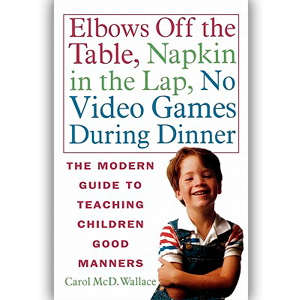
No Video Games During Dinner
 I was looking for a modern guide to teaching children good manners so I decided to read Elbows Off the Table, Napkin in the Lap, No Video Games During Dinner by Carol McD. Wallace. Wallace offers parents advice for what to teach and when. Breaking it down to three stages – basic training, the age of reason, and the young sophisticate, Wallace helps parents nurture civilized behavior without turning their homes into boot camp.
I was looking for a modern guide to teaching children good manners so I decided to read Elbows Off the Table, Napkin in the Lap, No Video Games During Dinner by Carol McD. Wallace. Wallace offers parents advice for what to teach and when. Breaking it down to three stages – basic training, the age of reason, and the young sophisticate, Wallace helps parents nurture civilized behavior without turning their homes into boot camp.
Interestingly, although part of the book’s title pertains to video games, they are never actually addressed. While one might be inclined to think it’s because the book’s a bit dated, the reality is handheld devices have been around for decades. Mattel offered the first one in 1977, and children have been tempted to play with them during dinner ever since. So why doesn’t Wallace mention them directly? Well, in the “For Parents Only” section, she explains, “The point is that families should be dependent on each other for entertainment during family meals.” This can’t happen if your child is glued to their DS or, worse yet, you can’t stop checking your phone. Therefore, no video games during dinner is a given.
Wallace argues, “If you’ve gone to all that trouble to carve out family time, why let the Little League coach interrupt it? Let the machine catch the calls and turn down the volume to eliminate any temptation to pick up the phone.” This advice undoubtedly applies to all the electric devices competing for your family’s time – cell phones, iPods, televisions, computers, and the like. So silence all devices and take the first step to teaching table manners, which is “helping your children appreciate that mealtimes are as much about communication as they are about eating,” according to Wallace.
I’ve started limiting social outings with friends, who can’t tear themselves away from their phones while they’re with me. If I’ve set aside time to visit, enjoy a cup of coffee, or have a meal, and the person I’m with can’t stop checking her texts or responding to emails, I not only find it rude but also believe it sends the message that I’m not worth their time. So I’ve simply stopped scheduling dates with them in favor of get-togethers with friends who act more respectfully.
In some ways, it’s worse with other parents, as they are perpetually acting under the pretense of making sure something hasn’t happened to their child. I get that, I do, but thankfully, real emergencies are far and few between. Besides, have we forgotten people tracked down parents, long before the dawn of cell phones, when there was a real emergency? If it’s that important, the person will find a way to reach. If not, then it wasn’t worth interrupting you anyway. But unfortunately, we’re all so worried we’re going to miss out on the something we’re actually missing out on the moment.
I apply these same rules of etiquette to my children’s friends. While Wallace recognizes at the end of her book that there’s “not a whole lot” you can do about other people’s children, you don’t have to have them over the house. When my 11 year old has had friends over, who can’t put down their phones long enough to actually play, they just don’t get invited back. My daughter’s smart. She gets it. Who wants a friend who treats you like that?
Unfortunately, there’s not a chapter in Wallace’s book on managing cell phones during non-dinner hours. In our house, we have one spot, where all the electronic devices get docked. This makes it easier for me to enforce our rule of only one hour of screen time a day. My ideal would be for friends to leave their devices there too, much like our family leaves its shoes at the door. And some of them do, which is always a good sign. I compare this practice to one in the 1989 film Say Anything. A character, Lloyd, is the key master. He’s in charge of collecting everyone’s keys at the beginning of the party and determining whether a person is sober enough to drive home at the end. Why not handle electronics the same way? Until you have proven that you can handle them responsibility, someone should be monitoring their use.
So if you’re looking for more insights into when manners are a must, check out Elbows Off the Table, Napkin in the Lap, No Video Games During Dinner by Carol McD. Wallace for tips on raising cool yet courteous kids.
Follow @WinterhalterV on Twitter for updates on blog posts or like Parenting by the Book on Facebook.






